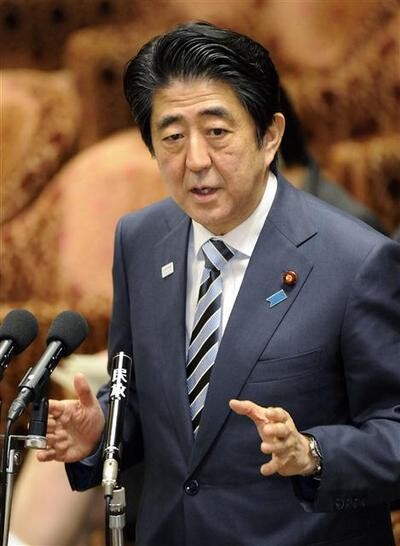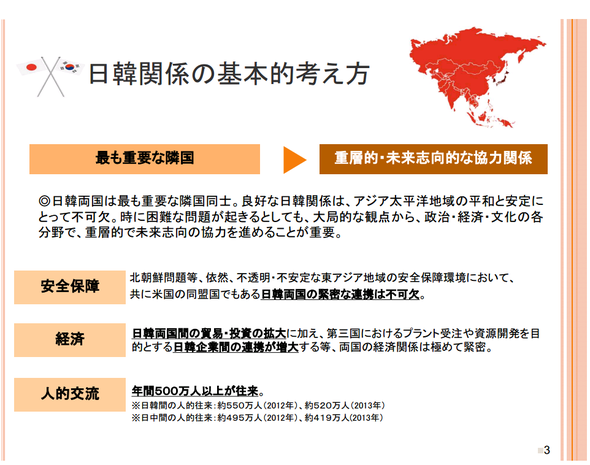hankyoreh
Links to other country sites 다른 나라 사이트 링크
Japan signaling important shift in how it views South Korea

On Jan. 15, Seo Cheong-won, a member of the senior council of the Saenuri Party (NFP), and other lawmakers with the Korea-Japan Parliamentarians’ Union paid a visit to Japanese Prime Minister Shinzo Abe. Seo was there to convey a message from President Park Geun-hye, who wanted to “work together to improve relations between the two countries,” on the 50th anniversary of the normalization of diplomatic relations between South Korea and Japan.
Abe met Seo and the others at his official residence. In a discussion about bilateral relations, Abe described South Korea and Japan as “important neighbors who share strategic interests.”
At the time, some South Korean foreign correspondents in Japan expressed their surprise that Abe had avoided the phrase he normally uses to describe relations between South Korea and Japan, “neighbors who share the fundamental values of freedom and democracy.” They wondered if he was implying that the two countries no longer share these fundamental values.
Could Abe’s remarks have been a veiled expression of Japan‘s grievances about South Korea? There has been a spate of significant changes recently that lead toward that exact interpretation.
On Mar. 4, Japanese newspaper the Asahi Shimbun said it confirmed on Mar. 2 that the Japanese Foreign Ministry had revised the description of South Korea that appears on its website, replacing the phrase “an important neighbor that shares with Japan the basic values of freedom, democracy, and market economy” with “Japan’s most important neighbor.”
In regard to the revision, the newspaper cited remarks by a Japanese government official about “distrust of South Korean society and the South Korean judiciary,” hinting that the revision may be the product of a tectonic shift in the Abe administration’s attitude toward South Korea.
During a policy speech on Feb. 12, Abe only referred to South Korea as “our most important neighbor” when discussing Japan’s relations with South Korea. During a diplomatic address on the same day, Japanese Foreign Minister Fumio Kishida merely described South Korea as “our most important neighbor who shares the values of securing peace and prosperity in the region.”
The assumption in South Korea and Japan that their fundamental shared values - such as democracy - should be the springboard for developing bilateral relations can be traced back to the Korea-Japan partnership announced in Oct. 1998 by then South Korean President Kim Dae-jung and then Japanese Prime Minister Keizo Obuchi.
At the time, Japan said that Korea had “achieved remarkable development and democracy through the ongoing effort of its people and had grown into a thriving and mature democratic state.”
Beginning in 2006, during his first term as prime minister, Abe pursued “values diplomacy,” with the understanding that Japan needed cooperation with important countries in the Asia-Pacific region including South Korea, India, and Australia in order to counter China.
This policy framework was left in place for some time even after Abe began his second term as prime minister in Dec. 2012. But with relations between South Korea and Japan on a downward spiral, the Japanese government has been making some serious changes since the beginning of this year.
These changes could represent the Abe administration‘s attitude toward several recent developments in South Korea, including the South Korean judiciary’s investigation and prosecution of Tatsuya Kato, former Seoul bureau chief for Japanese newspaper Sankei Shimbun, on charges of defamation.
Indeed, major Japanese newspapers, including the Yomiuri Shimbun, have printed a series of articles expressing their astonishment at rulings by the South Korean Supreme Court granting individual Koreans who were forced to work for the Japanese during the colonial occupation the right to sue for reparations. These rulings have come during the past two years, while relations between the two countries were deteriorating.
“The changes to the website of the Japanese foreign ministry appear not to have been random but rather to reflect Abe’s will. This is also implied by how Abe altered the way he referred to South Korea in his policy speech. Recently, this is how Japan has been expressing its displeasure with developments in Korea,” said Cho Se-yeong, visiting professor at Dongseo University.
“It would not be appropriate for us to comment about the language used by the Japanese government,” said a senior official with the South Korean Ministry of Foreign Affairs, which declined to respond.

By Gil Yun-hyung, Tokyo correspondent and Kim Oi-hyun, staff reporter
Please direct questions or comments to [english@hani.co.kr]

Editorial・opinion
![[Column] Season 2 of special prosecutor probe may be coming to Korea soon [Column] Season 2 of special prosecutor probe may be coming to Korea soon](https://flexible.img.hani.co.kr/flexible/normal/500/300/imgdb/original/2024/0426/3317141030699447.jpg) [Column] Season 2 of special prosecutor probe may be coming to Korea soon
[Column] Season 2 of special prosecutor probe may be coming to Korea soon![[Column] Park Geun-hye déjà vu in Yoon Suk-yeol [Column] Park Geun-hye déjà vu in Yoon Suk-yeol](https://flexible.img.hani.co.kr/flexible/normal/500/300/imgdb/original/2024/0424/651713945113788.jpg) [Column] Park Geun-hye déjà vu in Yoon Suk-yeol
[Column] Park Geun-hye déjà vu in Yoon Suk-yeol- [Editorial] New weight of N. Korea’s nuclear threats makes dialogue all the more urgent
- [Guest essay] The real reason Korea’s new right wants to dub Rhee a founding father
- [Column] ‘Choson’: Is it time we start referring to N. Korea in its own terms?
- [Editorial] Japan’s rewriting of history with Korea has gone too far
- [Column] The president’s questionable capacity for dialogue
- [Column] Are chaebol firms just pizza pies for families to divvy up as they please?
- [Column] Has Korea, too, crossed the Rubicon on China?
- [Correspondent’s column] In Japan’s alliance with US, echoes of its past alliances with UK
Most viewed articles
- 1‘We must say no’: Seoul defense chief on Korean, USFK involvement in hypothetical Taiwan crisis
- 2After election rout, Yoon’s left with 3 choices for dealing with the opposition
- 3Why Kim Jong-un is scrapping the term ‘Day of the Sun’ and toning down fanfare for predecessors
- 4AI is catching up with humans at a ‘shocking’ rate
- 5Two factors that’ll decide if Korea’s economy keeps on its upward trend
- 6Division commander ordered troops to enter raging flood waters before Marine died, survivor says
- 7[Column] Park Geun-hye déjà vu in Yoon Suk-yeol
- 8[Editorial] Korea’s surprise Q1 growth requires objective assessment, not blind fanfare
- 9No good, very bad game for Korea puts it out of Olympics for first time since 1988
- 10Noting shared ‘values,’ Korea hints at passport-free travel with Japan